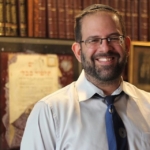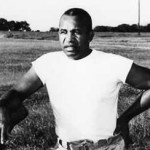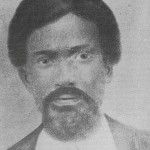Jefferson and Hemings: How Negotiation Under Slavery Was Possible
Image: Mothers being separated from their children at a slave auction. Although enslaved people held little leverage, some tried to negotiate to keep their families together. (Credit: Benoitb/Getty Images)
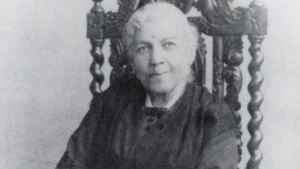
When she couldn’t negotiate with her enslaver, Harriet Jacobs went to extensive lengths to avoid his sexual advances. Later, as a free woman and abolitionist, she became one of the first people to publicly raise the topic of sexual violence against slave women. (Credit: Public Domain)
(History) In the power relationship between America’s enslaved people and their enslavers, it’s widely assumed that the planter class held all the cards. After all, they were the dominant group who frequently enforced their will with whips, chains, dogs—and worse. Most enslaved people were considered little more than legal property, business investments whose human needs and family relationships were relevant only as far as they affected productivity and the bottom line of the people they served.
So when faced with the question of whether enslaved people could negotiate any aspect of their lives with their enslavers, the prospect seems hard to imagine. With power stacked so overwhelmingly against them, what could the enslaved negotiate for—and with what leverage? How could an enslaver concede even small favor to one, while maintaining fear and order among the broader ranks? The reality was complicated: In navigating lives of privation and brutality, enslaved people haggled, often daily, for liberties small and large, from rare personal time to less harsh treatment for themselves or family members, even to being set free.
The case of Sally Hemings and America’s third president Thomas Jefferson, touched on recently in a new exhibit at Jefferson’s home Monticello, shines a light on this little-discussed aspect of America’s “peculiar institution.” Hemings’ story is an extraordinary one—since it chronicles not only a 16-year-old enslaved girl who had the life experience and presence of mind to negotiate for her unborn children’s future freedom, but a founding father whose complex moral code moved him to honor his agreement with a woman he enslaved for decades. (more)
Britt Institute Seeks to Promote West Texas Black History
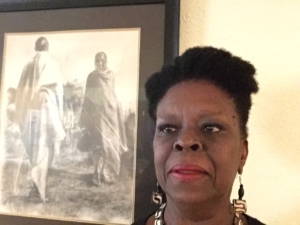
Sherley Spears, founder of The Britt Institute in San Angelo, dedicated to the study of African American history in West Texas.
(San Angelo LIVE!) Sherley Spears is a local business owner, community advocate and the founder of The Britt Institute, an educational, research and development organization dedicated to African American history in the western part of Texas.
The mission of the Britt Institute is to research and provide symposiums and workshops to inform and educate the general public about contributions of African Americans in the western Texas region.
(Reporter Gloria Johns) sat down with Spears to get details on The Britt Institute and the role she plays in moving The Institute forward.
Q: What motivated you to establish The Britt Institute?
 Spears: I’ve always had an interest in Black History from the time I was very young. I guess growing up during the Civil Rights era helped to create that interest because I was experiencing so much of the movement.
Spears: I’ve always had an interest in Black History from the time I was very young. I guess growing up during the Civil Rights era helped to create that interest because I was experiencing so much of the movement.
Living here in San Angelo, and visiting various cities in the western region of Texas, I’ve become more knowledgeable about Black history in this region. But I couldn’t find one source that contained the rich history, so I imagined The Britt Institute to record that history, and created a magazine, The Legacy Magazine, to share it with the public. (more)
African-American history in Oklahoma contains sit-ins, soldiers, entrepreneurs and more
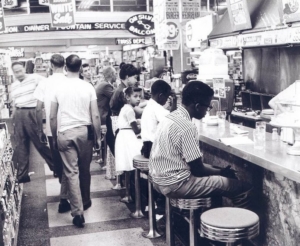
Children from the NAACP Youth Council took part in sit-ins in 1958 to desegregate the Katz Drug Store lunch counter in downtown Oklahoma City. The late civil rights activist and teacher Clara Luper organized the Youth Council and served as adviser. [John Melton Collection, OHS.]
The Oklahoma Historical Society (OHS) will recognize the 60th anniversary of the Katz Drug Store sit-in that began on Aug. 19, 1958, with an event scheduled for 7 p.m. Aug. 16 at the Oklahoma History Center.
“It is extremely important that we recognize and celebrate the contributions of the NAACP Youth Council and their adviser, Mrs. Clara Luper, which contributed to the passage of the 1964 Civil Rights Act that outlawed discrimination in public accommodations,” said Bruce Fisher, curator of special projects for the OHS.
“The sit-ins were a strategy used early in Oklahoma City,” he said. “A year and a half later, college students utilized this same strategy in the Greensboro sit-ins of 1960. We hope to reinforce the fact that some of the earliest major sit-ins occurred in Oklahoma City, and to appeal to the National Museum of African American History and Culture to include the Oklahoma City sit-in movement in its exhibits.” (more)
PVAMU second-ranked in Top 50 Best Value Historically Black Colleges & Universities 2018
 (Value Colleges) Value Colleges compiles a range of data to determine what colleges and universities can provide the balance of quality, affordability, and opportunity to be considered a best value. We ranked America HBCUs based on four metrics:
(Value Colleges) Value Colleges compiles a range of data to determine what colleges and universities can provide the balance of quality, affordability, and opportunity to be considered a best value. We ranked America HBCUs based on four metrics:
– Reputation (based on U.S. News & World Report ranking)
– ROI (based on College Scorecard data)
– Real Cost (nonresident, based on IPEDs data)
– Graduation Rate (based on Department of Education data)
By bringing together all of these elements, Value Colleges has put together our definitive ranking of the historically black colleges and universities that have been proven to give graduates what they need – a degree that will show a real return on their college investment.
“Prairie View is particularly known as a STEM leader – with a student body of less than 10,000 PVAMU still has the second-highest number of black STEM graduates in the A&M system. That includes biology and biomedical programs, with PV ranking in the top for African-American biology students, and a respected pre-medical program designed to close the national gap in minority doctors.” (more)
When a rabbi and a reverend take a Jewish-Black tolerance road trip
(The Jerusalem Post) A rabbi and a reverend go on a road trip.
What sounds like the start of a joke is actually an effort by two Austin, Texas faith leaders to gain a deeper understanding of each other’s communities.
Rabbi Neil Blumofe of Congregation Agudas Achim in Northwest Austin and Assistant Pastor Daryl Horton of Mount Zion Baptist Church in East Austin will embark on a multistate road trip Monday, making stops at the Holocaust Museum in Houston; the Legacy Museum and National Memorial for Peace and Justice in Montgomery, Ala.; and the National Civil Rights Museum in Memphis, Tenn.
Through confronting the historical trials and traumas of the Jewish and African-American communities, Blumofe and Horton hope to engage in meaningful dialogue and set a positive example for their congregations. (more)
TIPHC Bookshelf
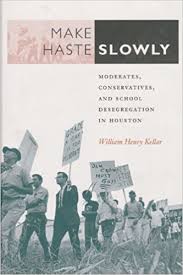 Published scholarship on black history in Texas is growing and we’d like to share with you some suggested readings, both current and past, from some of the preeminent history scholars in Texas and beyond. We invite you to take a look at our bookshelf page – including a featured selection – and check back as the list grows. A different selection will be featured each week. We welcome suggestions and reviews. This week, we offer, “Make Haste Slowly — Moderates, Conservatives, and School Desegregation in Houston,” by William Henry Kellar.
Published scholarship on black history in Texas is growing and we’d like to share with you some suggested readings, both current and past, from some of the preeminent history scholars in Texas and beyond. We invite you to take a look at our bookshelf page – including a featured selection – and check back as the list grows. A different selection will be featured each week. We welcome suggestions and reviews. This week, we offer, “Make Haste Slowly — Moderates, Conservatives, and School Desegregation in Houston,” by William Henry Kellar.
When faced by the Court-ordered “all deliberate speed” time frame for school desegregation, a fearful Houston school board member urged the city to “make haste slowly,” in order for the school system to receive decisions based on sound judgment and discretion.
Houston, Texas, had what may have been the largest racially segregated “Jim Crow” public school system in the United States when the Supreme Court declared the practice unconstitutional in 1954. Ultimately, helped by members of its business community, Houston did desegregate its public schools and did so peacefully, without making the city a battleground of racial violence.
In Make Haste Slowly, William Henry Kellar provides the first extensive examination of the development of Houston’s racially segregated public school system, the long fight for school desegregation, and the roles played by various community groups, including the HISD Board of Education, in one of the most significant stories of the civil rights era.
Drawing on archival records, HISD School Board minutes, interviews with participants in the process, the oral history collection of the Houston Metropolitan Research Center, and a variety of other sources, Kellar constructs a detailed account of the development of Houston’s segregated public school system and the struggle of Houston’s African American community against the oppression of racial discrimination in the city.
Kellar shows that, while Houston desegregated its public school system peacefully, the limited integration that originally occurred served only to delay equal access to HISD schools. Houstonians shifted from a strategy “massive resistance” to one of “massive retreat.” White flight and resegregation transformed both the community and its public schools.
Kellar concludes that forty years after the Brown decision, many of the aspirations that landmark ruling inspired have proven elusive, but the impact of the ruling on Houston has changed the face of that city and the nature of its public education dramatically and in unanticipated ways.
Make Haste Slowly fills a longtime void in the literature on the civil rights era in Texas. Those interested in Texas history and African American history will find this book essential to understanding one of the most reactionary periods in American history.
This Week in Texas Black History
Jul 30
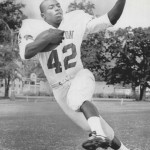 On this day in 1946 Warren McVea was born in San Antonio. McVea was arguably the top high school running back in the country when he graduated from Brackenridge High School in 1964. During his senior season, McVea scored 315 points and 46 touchdowns, which was a single-season record for the University Interscholastic League’s largest school classification (4A). In college, “Wondrous Warren” was the first black player for the University of Houston program and the first to receive a scholarship to a major previously all-white college in Texas. Professionally, he was a fourth-round pick by the Cincinnati Bengals and was a member of the Kansas City Chiefs when they won Super Bowl IV, defeating the Minnesota Vikings. He was inducted into the San Antonio Sports Hall of Fame in 2003 and the UH Hall of Honor in 2004.
On this day in 1946 Warren McVea was born in San Antonio. McVea was arguably the top high school running back in the country when he graduated from Brackenridge High School in 1964. During his senior season, McVea scored 315 points and 46 touchdowns, which was a single-season record for the University Interscholastic League’s largest school classification (4A). In college, “Wondrous Warren” was the first black player for the University of Houston program and the first to receive a scholarship to a major previously all-white college in Texas. Professionally, he was a fourth-round pick by the Cincinnati Bengals and was a member of the Kansas City Chiefs when they won Super Bowl IV, defeating the Minnesota Vikings. He was inducted into the San Antonio Sports Hall of Fame in 2003 and the UH Hall of Honor in 2004.
Aug 1
 On this day in 1948, football and track star Clifford Branch was born in Houston. At Evan E. Worthing High School, Branch was All-District in football (1966), but was also the first schoolboy in Texas history to run the 100-yard dash in 9.3 seconds. He was the state champion in the 100-yard dash (1965) and the 220-yard dash (1966). He attended the University of Colorado where he was an All-American wide receiver (1971) and the 1972 NCAA 100-meter champion with a record time of 10.0. Branch was selected in the fourth round of the National Football League Draft by the Oakland Raiders and played his entire pro career (1972-85) with the team, including three Super Bowl titles. He was named first-team All-Pro three times and finished his career with 501 receptions for 8,685 yards and 67 touchdowns. He is a member of the Prairie View Interscholastic League Hall of Fame.
On this day in 1948, football and track star Clifford Branch was born in Houston. At Evan E. Worthing High School, Branch was All-District in football (1966), but was also the first schoolboy in Texas history to run the 100-yard dash in 9.3 seconds. He was the state champion in the 100-yard dash (1965) and the 220-yard dash (1966). He attended the University of Colorado where he was an All-American wide receiver (1971) and the 1972 NCAA 100-meter champion with a record time of 10.0. Branch was selected in the fourth round of the National Football League Draft by the Oakland Raiders and played his entire pro career (1972-85) with the team, including three Super Bowl titles. He was named first-team All-Pro three times and finished his career with 501 receptions for 8,685 yards and 67 touchdowns. He is a member of the Prairie View Interscholastic League Hall of Fame.
Aug 2
Legendary Prairie View A&M football coach William J. “Billy” Nicks was born on this day in 1905 in Griffin, Ga. He attended Morris Brown College in Atlanta where he played football, basketball, baseball, and ran track. Nicks returned to his alma mater as head football coach on three different occasions — 1930-35, 1937-39 and 1941-42. His 1941 team was named black college national champion. Nicks began coaching at Prairie View in 1945 and in 17 years compiled a 127-39-8 record and won eight Southwestern Athletic Conference championships and five black college national championships. He had five undefeated seasons as Prairie View became a black college football power in the 1950s and 1960s. Nicks had a winning record against every SWAC school, including Grambling State and legendary head coach Eddie Robinson. His overall record, for 28 years, was 193-61-21, a winning percentage of .763. Nicks is a member of numerous halls of fame, including the College Football Hall of Fame, NAIA, and the SWAC.
Aug 2
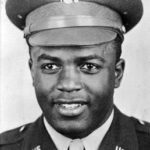 In 1944, 15 months before he would break Major League Baseball‘s color barrier, the court martial of 2nd Lt. Jackie Robinson was held on this day at Fort Hood in Killeen. On July 6, Robinson had refused to move to the “colored section” in the back of a post bus. Among the several resulting charges against Robinson were conduct unbecoming an officer. The trial lasted four hours and after brief deliberations, a panel of nine officers (one of them black) found Robinson not guilty of all charges. Robinson had been morale officer for the all-black 761st Tank Battalion but, by the trial’s end, the unit had departed for Europe where they would perform heroically with Gen. Patton’s Third Army. Robinson was transferred to Camp Breckinridge, Kentucky, where he coached black athletic teams until his honorable discharge in November 1944. He played the 1945 season with the Negro League Kansas City Monarchs and in October of that year signed to play with the Brooklyn Dodgers and was sent to their top Minor League affiliate, the Montreal Royals. Robinson’s debut as MLB’s first black player came on April 15, 1947, at age 28.
In 1944, 15 months before he would break Major League Baseball‘s color barrier, the court martial of 2nd Lt. Jackie Robinson was held on this day at Fort Hood in Killeen. On July 6, Robinson had refused to move to the “colored section” in the back of a post bus. Among the several resulting charges against Robinson were conduct unbecoming an officer. The trial lasted four hours and after brief deliberations, a panel of nine officers (one of them black) found Robinson not guilty of all charges. Robinson had been morale officer for the all-black 761st Tank Battalion but, by the trial’s end, the unit had departed for Europe where they would perform heroically with Gen. Patton’s Third Army. Robinson was transferred to Camp Breckinridge, Kentucky, where he coached black athletic teams until his honorable discharge in November 1944. He played the 1945 season with the Negro League Kansas City Monarchs and in October of that year signed to play with the Brooklyn Dodgers and was sent to their top Minor League affiliate, the Montreal Royals. Robinson’s debut as MLB’s first black player came on April 15, 1947, at age 28.
Aug 4
On this day in 1840, minister and Republican State Senator Matthew Gaines was born into slavery in Pineville, La. In 1863, he was sold to a planter in Fredericksburg where he worked as a blacksmith and a sheepherder. After emancipation, he relocated to Washington County where he became a leader of the black community, and was elected as a state senator during Reconstruction to represent the Sixteenth District. He was a staunch proponent for education, prison reform, the protection of blacks at the polls, the election of blacks to public office, and tenant-farming reform.
Aug 4
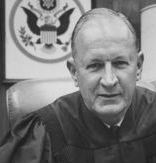 District Court Judge Ben Connally labeled the Houston school board‘s desegregation plan a “palpable sham and subterfuge” on this day in 1960. Houston’s 173 schools comprised the largest segregated school district in the U.S., and in 1957 Connally ordered the schools to be integrated “with all deliberate speed.” However, in August, 1959, the board revealed in a 373-page report to the Court that it had no desegregation plan and requested additional time to prepare one. Connally ordered the board to submit a plan by June 1, 1960. It was that plan which enraged Connally. In it, the board sought to integrate only three schools, but stated that no child need attend the integrated schools. As a result, Connally ordered desegregation to commence in all first grades in September 1960 and to proceed at one grade per year thereafter. The board’s attitude may have been typified by parliamentarian Bertie Maughmer who had won election to the board in 1956 proudly declaring: “I’d rather go to jail than see my kids go to school with niggers.”
District Court Judge Ben Connally labeled the Houston school board‘s desegregation plan a “palpable sham and subterfuge” on this day in 1960. Houston’s 173 schools comprised the largest segregated school district in the U.S., and in 1957 Connally ordered the schools to be integrated “with all deliberate speed.” However, in August, 1959, the board revealed in a 373-page report to the Court that it had no desegregation plan and requested additional time to prepare one. Connally ordered the board to submit a plan by June 1, 1960. It was that plan which enraged Connally. In it, the board sought to integrate only three schools, but stated that no child need attend the integrated schools. As a result, Connally ordered desegregation to commence in all first grades in September 1960 and to proceed at one grade per year thereafter. The board’s attitude may have been typified by parliamentarian Bertie Maughmer who had won election to the board in 1956 proudly declaring: “I’d rather go to jail than see my kids go to school with niggers.”
Blog: Ron Goodwin, Ph.D., author, PVAMU history professor
Ron Goodwin is an assistant professor of history at Prairie View A&M University. Even though he was a military “brat,” he still considers San Antonio home. Like his father and brother, Ron joined the U.S. Air Force and while enlisted received his undergraduate degree from Texas Lutheran University in Seguin, Texas. After his honorable discharge, he completed graduate degrees from Texas Southern University. Goodwin’s book, Blacks in Houston, is a pictorial history of Houston’s black community. His most recent book, Remembering the Days of Sorrow, examines the institution of slavery in Texas from the perspective of the New Deal’s Slave Narratives.
Recent Posts
Television — Fifty Years Later
Social pundits often consider 1968 a pivotal year in our democracy. Fifty years later, the deaths of Martin Luther King, Jr. and Robert F. Kennedy have many liberals questioning how compassionate our democracy may have been had they lived. There is no doubt they would have made a powerful one-two punch in eradicating many of the social ills caused by uncontrolled capitalism. Fifty years later we are also dealing with the implosion of the Democratic
King of Kings
During his lifetime Martin Luther King consistently paralleled the experiences of the biblical Children of Israel and the experiences of Africans in America. As a result, he thrust himself into the role of Moses. What I find interesting in these parallels was the ultimate goal of the story. The Children of Israel, after 400 years of bondage, eventually made their way to the Promised Land. This was the message that I believe King was ultimately
Submissions wanted
Historians, scholars, students, lend us your…writings. Help us produce the most comprehensive documentation ever undertaken for the African American experience in Texas. We encourage you to contribute items about people, places, events, issues, politics/legislation, sports, entertainment, religion, etc., as general entries or essays. Our documentation is wide-ranging and diverse, and you may research and write about the subject of your interest or, to start, please consult our list of suggested biographical entries and see submission guidelines. However, all topics must be approved by TIPHC editors before beginning your research/writing.
We welcome your questions or comments. Please contact Mr. Michael Hurd, Director of TIPHC, at mdhurd@pvamu.edu.
Click edit button to change this text.


